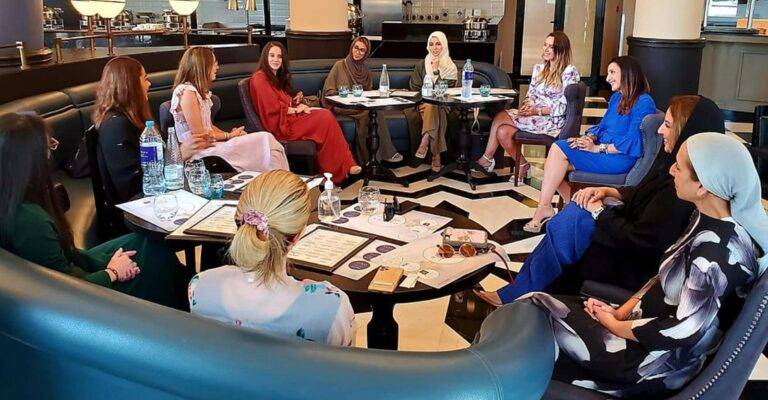Two years on, the Accords are creating endless opportunities for B2B companies in the MENA region and building a pro-business environment.
By Jonathan Frenkel, ISRAEL21c
Two years on, the Abraham Accords have made a positive impact on entrepreneurs and investors in Israel and the Gulf.
The accords have created a pro-business environment in the region, and indirectly brought positive momentum to deals such as the maritime border agreement between Israel and Lebanon, which are driven by local economic interests.
Entrepreneurs from both sides have grown their businesses because of the accords.
Normalization is happening at a steady pace despite the difference in how each side approaches business relationships: The UAE is relationship-driven and there are no quick wins, which is the opposite of how many Israeli high-tech entrepreneurs operate.
Since the accords were signed, there have been notable steps in deepening the economic relations between both countries such as the Dubai International Chamber’s decision to open an office in Tel Aviv. This office’s mission is twofold; to help local Israeli investors navigate business opportunities in the UAE, as well as support Dubai based businesses looking to grow in the Startup Nation.
In addressing this monumental opportunity Hassan Al Hashemi, Vice President International Relations, Dubai Chambers noted that: “Israel is a market of strategic importance to Dubai and by building on our bilateral business partnerships we can accelerate the competitiveness of companies in both countries and better compete in the international arena.”
According to Israel’s Central Bureau of Statistics trade between Israel and the United Arab Emirates reached $212.6 million in August 2022, constituting a 163% increase in trade from August 2021. For the first eight months of 2022, bilateral trade was just over $1.62 billion, constituting a 121% increase in trade from the first eight months of 2021.
Relationships take time, particularly for countries like these which have never had diplomatic relationships, but the actions taken by individuals, institutions and entrepreneurs who have pushed forward in building this future shows how tangible the vision of peace is.
Public-private partnerships
It’s not only entrepreneurs who are creating value. As soon as the accords were signed, new organizations were hatched to facilitate business opportunities.
An example of one such catalyst is Noa Gastfreund, VP of Business Development at UNIPaaS and cofounder of the UAE-IL Tech Zone. This organization developed out of The Hybrid accelerator program for Arab-led Israeli startups.
In the context of the Abraham Accords, the UAE-IL Tech Zone focuses on building bridges between the two regions through tech. The group boasts more than 2,000 members and has hosted delegations of VCs and growth-stage companies that visited the Gulf. Other programs focus on people-to-people connections to build sustainable relationships.
As Gastfreund states, “Israel has a ‘global first’ approach in which companies penetrate bigger markets. One of the reasons is that they couldn’t really penetrate the MENA region until this accord was signed… and as such, Israel is now partnering with the Gulf on technologies such as renewable energies, desert tech, food tech, agritech, digital health, fintech and more.”
Another facilitating organization is the female-founded DANA Accelerator in Abu Dhabi, providing regional collaboration, innovation mentorship, impact community and funding to women-led startups in desert tech sectors including agritech, water solutions, food security, waste management and renewable energy.
DANA works with Emirati, Palestinian and Israeli women entrepreneurs alongside government institutions to solve major challenges in the Gulf.
Building operations in the Gulf
For many Israeli founders, the idea of opening of relations between both countries meant additional investors from the Gulf. There have already been notable investments in Israeli startups, such as the recent nearly $200 million round led by the Qatar Investment Authority into cybersecurity company Snyk.
However, what the Gulf has more importantly provided Israeli companies with is a base of operations, and access to top-tier talent.
One of the hopes of the Abraham Accords was that growing Israeli companies would open offices in the UAE.
Israeli payment fintech startup Raypd has the largest presence of any Israeli company in the UAE, with just under 80 employees, and a goal of growing the office to 200 employees in the next three years.
Rapyd’s Dubai office, opened over a year ago as an engineering and product hub focused on relocating workers from all over the world, is its second biggest hub outside Tel Aviv. The company found it easier to recruit engineering talent globally as post-Covid Dubai has become an attractive destination.
As CEO Arik Shtilman stated, “It’s about recruiting. We believe that product and engineering should work together; Dubai became a hub for expats to move to during the pandemic and post-Covid as an attractive global destination for talent… similar to what Singapore may have been in the past.”
As such, Raypd set up offices in the Dubai Free Zone; the local government was able to expedite visa requests, as well as offer the company an unlimited number of visas. This springboard is providing Raypd with the ability to sell to the UAE, Jordan and Egypt.
Rapyd also is the first Israeli startup to receive a license from local UAE regulators to sell its fintech products.
With the promising possibility that Saudi Arabia will normalize relations with Israel, a base in the Gulf offers endless opportunities for B2B companies in the MENA region.
When that normalization happens, the region will reflect on the Abraham Accords as the catalyst for those strong economic ties.
Jonathan “Yoni” Frenkel is a content strategist and founder of YKC Media, a digital marketing agency that works with the global tech/venture/startup community.
Send 'Warm Winter' Care Packages to Israeli Soldiers - They are Cold!
We are honored to thank the young men and women of the IDF who risk their lives every day to defend the citizens of Israel.
Join us in sending winter care packages and personal notes of support to Israeli soldiers who are out in the cold all day.
Warm up a soldier's heart with essential winter wear including fleece jackets. Keep an entire unit warm by ordering 10 packages... The soldiers truly appreciate your love and concern!
Send Passover Packages to Needy Israeli Soldiers - Bring Them Joy!
We are honored to thank the young men and women of the IDF who risk their lives every day to protect the citizens of Israel. Since October 7th, soldiers have been on the battlefield for months - many are hoping to come home for Passover.
Join us in sending Passover food packages (and personal notes) to Israeli soldiers and their families.
Many soldiers spend the Passover holiday with needy families back home. The soldiers greatly appreciate your love and concern. Bring them Passover joy!
CLICK HERE TO SEND YOUR PACKAGE AND NOTE TO ISRAELI SOLDIERS!





